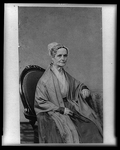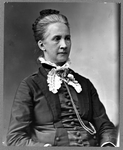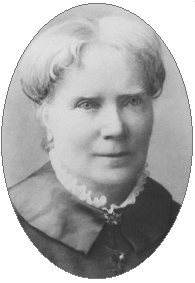Education
Education for women in the 1800's was a step to women equality. Early in
the 1800's women were not allowed to continue school after grammar school. If they wished, they could continue their studies privately because women were considered feeble minded, intellectually challenged, and could not study beyond grammar school. As the years rolled by, women protested that they too should have a right to learn and that it is unfair that men could go to college and they can't. These brave women are our founding mothers of women education today.
In 1818, Emma Willard made an appeal to the New York State legislature to fund education. She got support from former president, Thomas Jefferson. The Common Council gave $4000 to fund Emma's school called the Troy Female Seminary in Troy, New York, which opened in Septemper 1821 and offered full courses of rigor subjects found in the best men's colleges.
Oberlin College, in Ohio, was the first college to admit both men and women, blacks and whites. The women did not receive full equality but they still received a chance for higher education. They were offered the "Ladies Course", which prepared them for motherhood, or the "Full Course".
Mary Lion established Mount Holyoke Seminary in 1837. The school offered classes practically the same as those at a men's college and it offered a complete education to women. Six other women colleges were founded as a result of Mary Lion's success, Barnard College, Bryn Mawr, Radicliff, Smith, Wellesley, and Vassar. The seven colleges were known as the Seven Sisters and they were considered female counterparts to male Ivy League colleges.
Politics
Women in the early 1800's were not supposed to be involved in politics. Men proclaimed that women were too emotional and that they could not handle the extra stress. Around the 1820's women stood up and took part in politics. They fought against slavery, abortions, women suffrage, and government issues. As one, they spoke out their feelings and beliefs using the media and at public gatherings. At first no one paid any attention to these women because they were criticized to be just foolish women, but they continued to speak until finally someone did listen them.
Mostly, women joined the American Society for the promotion of the Temperance in 1826 to go on a battle against alcohol. They wanted to reduce the high consumption of alcohol in men, women, and children. Back then, drinking alcohol on a normal basis was accepted by society. These women did not want the children to grow up in a drunken society or growing up with health problems due to alcohol. They held several conventions and in 1851 Maine became the first state to have prohibition. These women set up a foundation for national legislation against alcohol.

Lucretia Mott organized the Philadelphia Female Anti-slavery Society in 1833 because women were not allowed to join the American Anti-slavery Society. Many women joined the Philadelphia Female Anti-slavery Society and they made the abolition of slavery a public issue and the first political movement they participated in. The Philadelphia Female Anti-slavery Society went on to focus on women's rights a few years later.
On July 19, 1848 two hundred and forty women attended a convention in Seneca Falls to discuss women's rights. At the convention, they came up with the "Declaration of the Sentiments" which was modeled after the Declaration of Independence. Suffrage was a main issue at the convention.Lucretia Mott, Susan B. Anthony, and Elizabeth Cady Straton were the leaders of the National Women Suffrage Association in 1869. They fought to help both women and slaves. The organization wanted to make an amendment saying that women should have the same rights men had.
In 1872, Victoria Woodhull becomes the first woman to run for the president of the United States. One of her campaign issues was to convince Congress to legalize women suffrage under the Fourteenth Amendment in the Constitution. Victoria's ex-husband walks back into her life and proclaims that she never divorced him and that Victoria got married while she was still legally married to him. The story got out and that ended her campaign for president.
In 1878, Senator Arlen A. Sargent of California submitted a women suffrage amendment to Congress. The proposal was modeled after the fifteenth amendment and it was mocked at Congress. Little do they know that this amendment would be the nineteenth amendment 45 years later.
Employment
Employing women for jobs in the early 1800's was rarely thought of until about 1820 when farmer girls needed to help with the family's financial problems. These girls were recruited because factory owners thought that were a dependable and obedient work force. Allowing women to work in factories opened many doors for women in the business world. They were given opportunities to work and see a different world that they would never have seen.
The Lowell Mill was the first mill to hire young women. In February 20, 1834, the mill began to cut wages up to 15% and increased production. The women decided to go on a strike. They fought for a 10-hour workday instead of just a few hours in one day. This strike proved that women are capable of organizing and persistent in achieving labor reforms as any man.
At the age of nine, Antoinette Blackwell was a full member of the Congregational Church in New York. In 1846, she went Oberlin to study in theology. Oberlin never gave her a degree when she graduated because Oberlin disapprove of a woman reading or reciting the holy bible in church. In 1853, the Congregational Church in South Butler, New York offered her a job a minister.

On March 3, 1879 Belva Lockwood was the first woman to be able to practice law before the Supreme Court. She was able to pass legislation in early 1879 that allow women to practice before the Supreme Court. Belva Lockwood's legislation brought down the barriers that had prejudice on women in the federal courts. The legislation also grounded court procedures in the state courts.
Science and Mathematics
In the 1800's women across the nation began to take a turn in science and mathematics. Many women became involve in the fields and they showed an interest in the subject that amazed men. Women scholars were accepted into colleges that offered the best classes of science and mathematics in the nation because their knowledge was valued greatly. More and more women looked back on their stereotype that women should only do "Household things" and opposed it. They realized that the new age of women was coming and that they should get a head start at it.
Maria Mitchell one day spotted a new comet and it was named after her. Her discovery led her to the election of the American Association for the Advancement of Science in 1848. Maria was then offered a job at Vassar College; there she worked with some of the most intellectual women in America. Also Maria was elected to the American Philosophical Society and she founded the Association for the Advancement of women.

After applying to many medical schools, Elizabeth Blackwell was finally accepted into Geneva Medical College in 1849. But the only reason that they accepted her was because they thought application was a hoax perpetrated by a rival college. She proved to the faculty and students at Geneva Medical College that a woman could do anything as well as a man. Elizabeth graduated at the head of her class.
Great Achievements of Women
Fanny Wright went on a tour in 1828-1829 to lecture about women's rights in education, property rights, rights in education, and the accessibility to birth control. She was strong in her lectures, which made her an expressive and practical speaker. Because it was unusual for a woman to speak at a public lecture, in fact it was unusual for a woman to even go to one, Fanny had much criticism on her. Even though Fanny was being criticized, she continued lecturing on her beliefs. Thus Fanny Wright opened a doorway for women's free speech.

Before 1851, Sojourner Truth was not allowed to speak in public but in 1851 she was allowed to speak in front of an audience at a women's rights convention. She captured the audience with her powerful and strong speech, "Ain't I a Woman." Sojourner continued fighting for women's rights and captivating the audiences on the way. People listened to her preaching because they were true and strong.
Women of the 1800's did many things that led up to women's recognition of equality in the 1900's. These women fought so that they could have rights in equality, to be treated as human being. They could not keep their own wages, children and sometimes even themselves. Education and job opportunities were very limited until women began to stand up and speak out. Whether they are young or old, everyone did something that led up to equality. Even if it was something little like refusing to marry who your father wants you to, that is one step to equality because that is saying that you have a mind of your own and that you should be able to choose who you will marry.